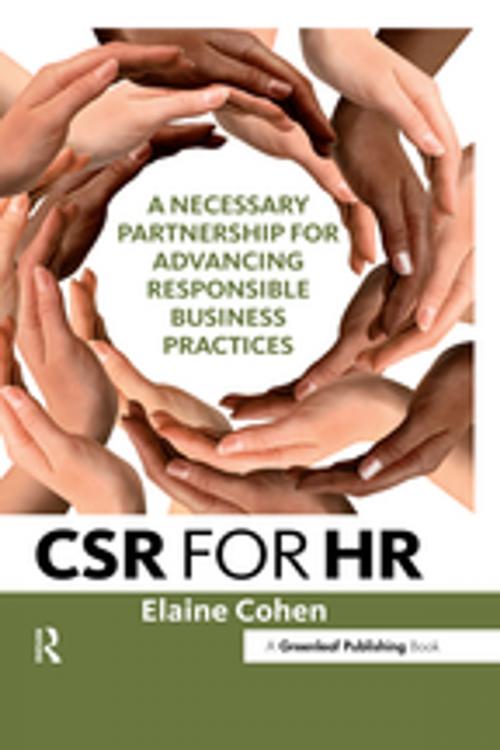CSR for HR
A Necessary Partnership for Advancing Responsible Business Practices
Business & Finance, Accounting, Auditing, Business Reference, Business Ethics| Author: | Elaine Cohen | ISBN: | 9781351278584 |
| Publisher: | Taylor and Francis | Publication: | September 8, 2017 |
| Imprint: | Routledge | Language: | English |
| Author: | Elaine Cohen |
| ISBN: | 9781351278584 |
| Publisher: | Taylor and Francis |
| Publication: | September 8, 2017 |
| Imprint: | Routledge |
| Language: | English |
Arguably, the Human Resources (HR) function is the key partner in embedding Corporate Social Responsibility (CSR) and Sustainability initiatives in any organisation, as this can be achieved only when a company educates, engages and empowers its entire workforce. This book goes even further and proposes that the HR function has a responsibility to be proactive in leading the way in establishing a company-wide CSR-enabled culture. And, yet, this is not happening. HR managers are preoccupied with their traditional roles of organizational development, recruitment, training and compensation, and are failing to see the opportunities that CSR brings for them as professionals and for their organizations.
CSR for HR has been designed to change the game. It provides HR managers with a thorough understanding of the drivers and principles of CSR and a practical step-by-step guide to the way CSR interfaces with every HR function. Recruitment, compensation, training, employee communications, employee well-being, health & safety, employee rights, involvement in the community, and employee impacts on the environment are all discussed from the CSR–HR standpoint, with many clear examples showing how HR can leverage CSR strategies to deliver greater benefit for the business, for employees, for society, for the environment and, ultimately, for HR professionals themselves.
The HR function plays a critical role in embedding a values-based, strategic CSR mindset and establishing an organizational culture that meets the needs of today's stakeholders. HR professionals who understand this and adapt accordingly will reap the benefits. The book explains why, how and what to do next, offering detailed advice, tools, a roadmap to get started and hundreds of tips from companies around the world, including original content from HR managers of large corporations.
Written from the standpoint of an HR professional waking up to the strategic possibilities of incorporating CSR in her day-to-day role, the book has an easy and engaging style, ideal for the busy managerial reader. CSR for HR is both a wake-up call and a toolkit and will be essential reading for practitioners in both HR and CSR, as well as being a sought-after teaching resource for both executives and students.
Arguably, the Human Resources (HR) function is the key partner in embedding Corporate Social Responsibility (CSR) and Sustainability initiatives in any organisation, as this can be achieved only when a company educates, engages and empowers its entire workforce. This book goes even further and proposes that the HR function has a responsibility to be proactive in leading the way in establishing a company-wide CSR-enabled culture. And, yet, this is not happening. HR managers are preoccupied with their traditional roles of organizational development, recruitment, training and compensation, and are failing to see the opportunities that CSR brings for them as professionals and for their organizations.
CSR for HR has been designed to change the game. It provides HR managers with a thorough understanding of the drivers and principles of CSR and a practical step-by-step guide to the way CSR interfaces with every HR function. Recruitment, compensation, training, employee communications, employee well-being, health & safety, employee rights, involvement in the community, and employee impacts on the environment are all discussed from the CSR–HR standpoint, with many clear examples showing how HR can leverage CSR strategies to deliver greater benefit for the business, for employees, for society, for the environment and, ultimately, for HR professionals themselves.
The HR function plays a critical role in embedding a values-based, strategic CSR mindset and establishing an organizational culture that meets the needs of today's stakeholders. HR professionals who understand this and adapt accordingly will reap the benefits. The book explains why, how and what to do next, offering detailed advice, tools, a roadmap to get started and hundreds of tips from companies around the world, including original content from HR managers of large corporations.
Written from the standpoint of an HR professional waking up to the strategic possibilities of incorporating CSR in her day-to-day role, the book has an easy and engaging style, ideal for the busy managerial reader. CSR for HR is both a wake-up call and a toolkit and will be essential reading for practitioners in both HR and CSR, as well as being a sought-after teaching resource for both executives and students.















